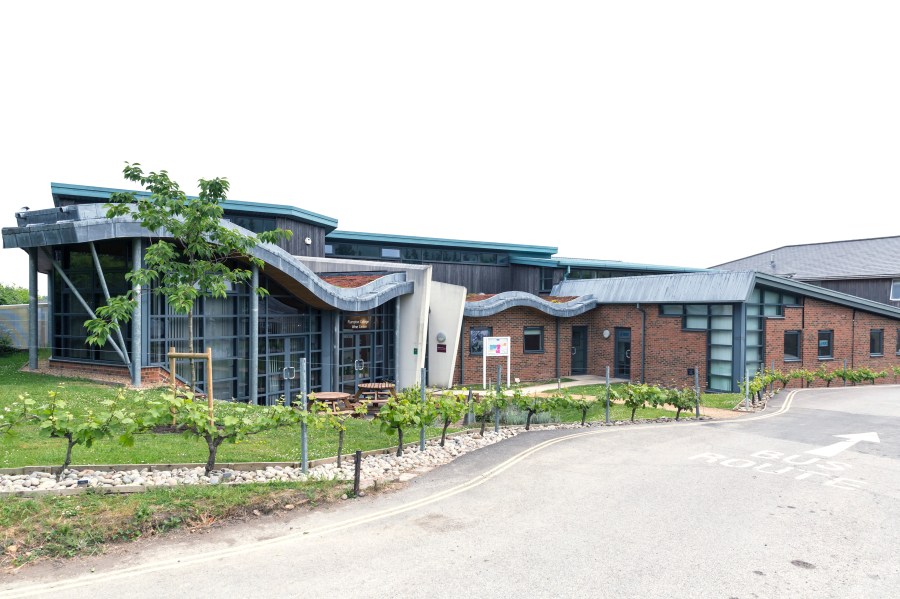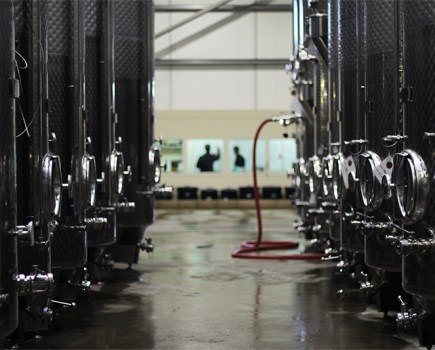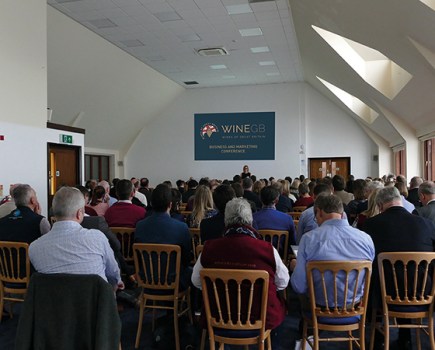Few readers of the magazine will be unfamiliar with the exemplary efforts Plumpton College has gone to over the past 30 years to develop Great Britain’s next generation of viticulturists, winemakers and wine industry professionals, but where did it all begin?
Responsible for establishing the wine division at Plumpton College, the man behind the magic, Chris Foss, was born with viticulture in his blood. Born in France in a family with a long track record of vine growing and winemaking, Chris completed a microbiology degree in the UK before returning to France to study wine in Bordeaux, moving on to run his family’s 20-hectare estate. While being employed as vineyard manager and winemaker, Chris was producing around 500,000 bottles per year for the daughter of the French supermarket magnate Eduard Leclerc.
In 1984, Chris decided to return to the UK and while seeking a vineyard manager’s position, undertook a teacher training degree in Wolverhampton. It was in 1988, after applying for the role of vineyard manager at St George’s Vineyard in Horam, East Sussex, that Chris was encouraged to consider teaching viticulture and oenology.
“The owner of St George’s had formed a group with other local vineyard owners to try and establish an education facility for the industry,” said Chris Foss, curriculum manager at Plumpton College. “The group had begun initial talks with Plumpton College, so I came to the college, they gave me a desk and off we went.”
Initially Chris set about developing the part time programmes, splitting his time between one week of vine growing courses, one week looking after the college’s vines, one week of winemaking courses and one week managing the winery.
“In 1992, we launched our first Higher National Diploma (HND) with the University of Brighton and that is when it really started to take off,” said Chris. “We are still running the part time courses, which are now badged as the WineSkills principles of vine growing and winemaking, but today our main bread and butter is the undergraduate courses.”
On his arrival at the college, Plumpton had just two rows of vines and work swiftly started on the establishment of a one-acre vineyard. With the growing popularity of the HND, it was agreed that more vines were needed and in 1993 the college took over Ditchling Vineyard, which had been planted in the 1970s.
“We also worked with St George’s vineyard for a few years,” said Chris. “It came at a rent which we couldn’t refuse and with a fantastic vineyard manager, Kevin Sutherland. After the Lewes floods, we decided to drop St George’s as we couldn’t access the site to harvest and we lost a lot of fruit.”
Around the same time, another historical English vineyard, Rock Lodge, came available. The site had been planted in the 1960s by Norman Cowderoy and was the initial home of Chapel Down, established by Norman’s son David, before it moved to Burgess Hill and later Tenterden.
“When David Cowderoy left the Rock Lodge site, Chapel Down continued to run the vineyard for a couple of years,” said Chris. “When they gave it up we took over and today students have access to 10 hectares of vines split across the Ditchling and Rock Lodge vineyards.”
Alongside the growing area of vines, just four years after embarking on the HND courses, the college again increased its course offering, running its first Batchelor of Science (BSc). Today the department welcomes over 100 students, with 10 members of staff working alongside Chris to deliver a programme of full and part time courses, ranging from A-Level equivalent up to Master’s level.
In addition to the extensive programme of courses now on offer, facilities at Plumpton College have also come a long way since Chris set up his first classrooms and winery in a redundant poultry building.
“In the early days, we were working from a classroom located within the poultry department,” said Chris. “It was difficult tasting wine because the whole area was surrounded by poultry sheds so I was transferred into the main building where I had a demonstration room.”
With the closure of Plumpton’s poultry department, Chris and the wine department moved back to the original site, with the poultry processing unit being transformed into one of the college’s first wineries.
In 2006, the wine department moved into a new purpose built wine centre, with over £1.5 million invested to provide students with modern classrooms, winery and research facilities.
Currently, Plumpton remains the only viticulture and oenology education provider in the UK, and is also the only higher education institution in Europe to teach both wine business and production programmes in English, but a lack of competition certainly hasn’t stopped Chris from setting the bar high. With its sights set on the world stage, the wine division has strived to develop an offering to rival institutions across Europe with international students flocking to study at the quality institution.
While other education providers may begin to establish viticulture and winemaking courses as the industry grows, Chris is confident that it will take a long time before they can begin to compete with the offering which has been developed over the last 30 years at Plumpton.
“Our biggest strength is the staff team, each one of them brings something different to the table and that has taken a long time to build,” said Chris. “There is also a lot of academic intellectual property for the courses too and others trying to develop programmes will need to be pretty determined to try and muscle in on that.”
Listening to the industry
While the wine centre has come on leaps and bounds from the early days, it is certainly not standing still, and the year ahead is set to see the launch of new courses, the restructuring of existing programmes as well as a focus on new research and innovation.
Dedicated to servicing the industry, Plumpton has been listening to what current growers and producers need to see from graduates. While there are few vineyard or winery managers who haven’t been to the college, as Brexit puts the availability of migrant labour into question and as the English and Welsh vineyards put more vines in the ground, there have been calls for graduates who can enter the vineyard at an operative level.
“The Level 3 advanced technical certificate in viticulture, which is the equivalent of an A-Level, has been introduced because the industry needs it,” said Chris. “We need more skilled assistant vineyard level people so it was high time we launched the new course.”
Part of the one-year programme, covering general plant biology, operation of machinery and health and safety, will be delivered by Plumpton’s horticultural department. Students specialising in viticulture will then receive tuition from Chris and Dr Greg Dunn and will work in the vineyard with Tom Newham. Finally, the course will include a work placement scheme, giving students the opportunity to work in a commercial vineyard one day per week.
Work placements are a crucial aspect of all Plumpton’s wine courses, not just the Level 3. They are beneficial for both students, who gain the experience needed, and for the vineyards and wineries who gain early access to the next generation.
“Quite often, if students are good at their placement they get a job at the end; that is what happened with Owen Elias our first placement,” said Chris. “We get a lot of offers from local vineyards who want to take our students. Gusbourne, for instance, contact us every January to get the best students and Ridgeview, Fox and Fox, Bluebell and Bolney are all great training grounds for our students.”
As well as increasing the availability of home-grown, skilled labour, the new Level 3 course also has the potential to capture the interest of a younger audience which the wine centre has previously been unable to tap into.
“Unlike traditional wine producing countries, there isn’t much of a second generation coming through yet and we still haven’t conquered the ‘school leaver’ market,” said Chris. “That is partly because of the alcohol factor and resistance from schools who don’t think it is appropriate for us to be talking about that with under 18s but this new course could open the door for younger entrants looking to go into the industry at an assistant manager level.”
For those who are just looking for a ticket to get into the industry, Plumpton is launching a series of intensive practical courses which will provide participants with the right skills, confidence, and a certificate of competence to apply for operative roles.
“The vineyard course will be held at Rock Lodge with very little classroom work,” said Chris. “For five days, the group of six will learn a range of practical skills from driving tractors and using tractor mounted implements, to putting in posts, tucking in, bud rubbing and we will also talk about pruning.”
In July 2018, an intensive wine making course will also be held. Over five days’ study students will cover the whole process, from working with half a tonne of grapes right up to the bottling and packaging stages.
Simultaneously, a reinforced focus on viticulture has also been implemented into the college’s existing wine production foundation degree and viticulture and oenology BSc programme structures. As well as helping the industry manage its ever-increasing area under vine, Chris believes that entering the industry though the vineyard door will open more opportunities for students.
“The industry has said they need more people focused on viticulture and we are trying to deliver,” said Chris. “Most students want to become winemakers but viticulture can help them to get their foot in the door. Once they have planted the vineyard and grown the grapes then they can design and establish their own winery.”
This redevelopment and refresh of the modules on offer has been facilitated by the wine centre’s new partnership with the Royal Agricultural University (RAU) in Cirencester, who will act as the awarding body to provide accreditation to the degree and master’s level courses.
“We have redesigned the courses to meet with their requirements,” said Chris. “It has allowed us to rethink what we do. The courses haven’t gone stale but we have been able to challenge the organisation of the curriculum.”
Having worked with the University of Brighton for 20 years, Plumpton felt it was time to develop new relationships with a more compatible establishment and believes that the link will open prospects for progress and collaboration.
“The RAU seemed like an obvious choice,” said Chris. “The synergy is there because they are an agricultural institution and have always been interested in the wine centre. Going forwards there are options for research collaborations and I would like to see Plumpton delivering courses in Cirencester on a regular basis.”
Research and innovation
Plumpton is also rolling out new research trials over the coming year. Working with the Food and Environment Research Agency (FERA), Chris has developed a system for monitoring spore release in the vineyard and students will be focused on detecting and recording levels of Downy mildew.
“It is a very straightforward system,” said Chris. “Matchsticks dipped in vaseline are attached to a rotor which spins at around 240 times per minute. As long as there are at least seven spores on the sticks, we can identify Downy and Powdery mildew and Botrytis through their genetic finger prints.”
Basic trails conducted last year demonstrated that Downy mildew wasn’t present in the vineyards until 26 July. It is hoped that these results will inform the spray programme, helping to save money, on labour and chemicals, while also benefiting the environment from reduced use of pesticides.
“In 2017 we ran just one of these machines but this year we are planning to run three in the vineyard and we will also have the analysis equipment here,” said Chris. “We are going to check the results against the real world and will have a special sampling walk around the vineyard, so a student will take regular trips looking out for visible signs of Downy mildew oil spots.”
Students will also be able to use a weather monitoring and Downy mildew prediction system to test how that calibrates and the college is also investing in a drone which is able to pick up Downy mildew oil spots and will be flown three times per week with the results processed on site.
“It will be interesting to see how the three methods of spore monitoring perform,” said Chris. “It will also generate data for the students to analyse. We are here to teach the next generation how to conduct proper trials. Everyone tries out different methods in the vineyard and winery but unless you organise tests and carry out statistical analysis you are not generating reliable data. Right from the first year we teach students how to design experiments and how to process the data. It is a big eye opener for them.”
Keeping students up to date with developments in technology, Plumpton has already invested in weather stations and Sectormentor to monitor the phenology of the vines. The drone will also be used to monitor the vigour of the vines and cover crops and other diseases like trunk disease symptoms.
“Inevitably there will be a big digital revolution in vineyards,” said Chris. “I think the industry is heading to a point where processes will be more robotised and our students have to be conscious of the new technologies which are coming through and how to work with them.”
Students are also involved with the wine centre’s wider research into climate change, adaptation and mitigation, and are able to work with the biggest collection of fungus resistant grape varieties, PIWIs, in the UK.
“We have around an acre of 40 different varieties of disease resistant vines,” said Chris. “Bred in Germany and Switzerland the new generation of vines are Powdery and Downy mildew resistant. Currently there are 50 of each in a randomised plot so we can get decent results on those.”
Alongside innovation in the vineyard, Plumpton College’s wine centre is also home to the largest Georgian Marani cellar in England and its new connection with Twins Winery in Kakheti, Georgia will allow students to learn more about making wine in qvevris, an earthenware vessel.
“This year 20 students travelled to Georgia and spent a week there as guests of the Georgian wine industry,” said Chris. “Last vintage we had one of the top Georgian winemakers here too and having that link is really good fun for the students.”
Commercial sales development
A truly exciting period of progression at Plumpton’s wine centre, new developments have also poured into the winery and commercial production arm of the institution with investments into new plantings, the appointment of a new brand manager and the rebranding of the college’s award-winning wines.
Keen to better reflect the industry’s focus on sparkling wine production, Ditchling Vineyard was replanted in May 2018 with Pinot noir, Pinot meunier and Chardonnay.
“At Rock Lodge we have a lot of trials and an array of varieties,” said Chris. “At the moment we are about one third sparkling wine, but we want to get up to about half. Our sparkling wine is a really good product, it’s stocked in Waitrose and we could easily sell more, so why not make more.”
While the £150,000 per year revenue from the wine centre’s commercial wine sales is a useful source of funding which is reinvested into the courses, the college does not adopt an aggressive commercial policy and the primary aim of the wines is to give students the necessary practical skills.
“Our primary aim is to be an international centre of excellence in wine education, training and research, so everything we do needs to reflect that,” said Chris. “With the wine making there are times where Sarah Midgley our winery instructor could do things differently, faster and more efficiently on her own, but that isn’t what it is about. She has to take the students with her and wait until they have learnt. We throw wine away because students are trying out different things and that is part of the learning process.”
Contribution to the industry
While many of the pioneers of the UK wine industry have proven that you don’t have to have been on a viticulture or winemaking degree course to be successful, the impact that Plumpton has had on the quality and growth of the industry is profound and pages could be filled with the esteemed alumni who started their prevalent careers at the college.
“There aren’t many in the UK wine industry who didn’t study here first,” said Chris. “Our job is to turn people into vine growers and winemakers in two or three years. We try very hard to give people as much technical knowledge and practical skills as possible so that by the time they leave they might not have perfected their talents but they will have learnt the proper way to do it from the beginning.”
As well as speeding up the learning process, by providing students with a high level of technical insight Chris also believes that alumni are better placed to work in today’s competitive industry.
“The industry is not only measured by its best wines but also by its worst wines,” said Chris. “Our job is to stop people making elementary mistakes and to give them a good understanding of wine quality. All students study Wine and Spirit Education Trust (WSET) Level 3 in their first semester so they have a basic idea of what people want to buy and I think that is terribly important.”
“We don’t have a monopoly on the best way of growing vines or making wine, but by giving students a deeper understanding of the subject they are also able to cut corners properly. If you are going to take risks you need to be able to evaluate and question the processes. That cannot be done without the background, general skills and wider understanding.”
As there is always more to learn, for those who have been self-taught, the courses on offer under the WineSkills umbrella provide an opportunity to bridge any gaps in knowledge and further understanding of key areas of vineyard management and winemaking.
“Most people in the industry have been on a WineSkills course of some sort,” said Chris. “Principles of vine growing for instance has sky rocketed and we are now running two intensive courses and two extensive courses per year, which is four times what we used to do.”
Looking back to the early days, Chris believes that links through the college also drove the English sparkling wine movement which has elevated the industry into the limelight and has put the country on the map as a global wine player.
“There are three big influences which have made a big impact on English wine, the changing climate, the changing market and Plumpton,” said Chris. “All the people who have helped kick start the industry, Sandy Moss, Mike Roberts, Owen Elias, have all studied here. David Cowderoy was one of our first lecturers and so was Will Davenport.”
One of the first student trips organised by Chris was to the Champagne region where the group met with the oenologist Georges Hardy (who established the Station Oenotechnique de Champagne) who was later invited back to England to give a presentation.
“That is when Stuart and Sandy Moss turned up and said they were planning to plant Champagne varieties at Nyetimber,” said Chris. “They wanted Georges to consult them, but he didn’t speak English, so he suggested one of his young protégés, Jean-Manuel Jacquinot. I have to say that while Sandy’s teaching at Plumpton helped, Jean-Manuel is the unsung hero of English sparkling wine. He was a tremendous influence on the movement and without him I think we would have had a lot of problems. I like to think that if I hadn’t brought over Georges Hardy we wouldn’t have had Jean-Manuel and things would have been very different.”
The wider industry
Aside from the viticulture and oenology, the wine centre at Plumpton is also a world class training ground for many of the UK’s wine trade. While many other wine business courses on offer in Europe tend to be tagged onto production courses, aimed at the sons and daughters of growers who want to increase their wine sales, Plumpton has designed a specific programme with the UK industry in mind.
“We work with big industry players like Bibendum and Oddbins to find out what skills they are looking for in candidates,” said Paul Harley, wine business programme manager at Plumpton College. “If there are any gaps in knowledge, such as margin construction or profit on return, we can feed these into the course to ensure that what we are delivering is viable and relevant to the trade.”
As the majority of wine business students end up in the wine trade, the college is also able to increase the visibility and recognition of English and Welsh wines.
“Training those who are destined for a future in buying positions is an important part of growing the industry,” said Paul. “Having the vineyards and winery means that our business students are aware of the processes and will be going into the trade with a solid understanding of what English wine is.”
The wine business programme benefits from a specialist module on English wine. It delves into the history, the viticulture and winemaking, the challenges and advantages of being in the UK and the marketing. There is also some analysis of the key producers.
“This year we looked at the evolution of Wines of Great Britain which happened as the module was running,” said Paul. “We also do a key tasting of still and sparkling wines. Students blind taste so they are not influenced by labels and then vote for the ones which they think are the best.”
With the appointment of Dr Greg Dunn, Plumpton’s wine centre now also offers a master’s level course in viticulture and oenology. One of the aims of the programme is to act as a conversion course, enabling students with degrees in biochemistry, genetics, environmental science, agronomy and other science related topics to focus on wine.
“Those studying on the master’s level are not necessarily going to become vineyard managers or winemakers,” said Chris. “It is an opportunity for us to develop specific industry advisers with graduates destined for vocations in agronomy, giving vine protection advice, or technical sides of the commercial industry such as wine analysis, closures and packaging.”
Addressing the knowledge of others working on the periphery of the industry, such as land agents, machinery dealers, Food Standards Agency inspectors and other professional services, the WineSkills courses give a good basic background and provide the ability for advisors to speak on equal terms when visiting producers.
With Plumpton’s education, training and research facilities at the disposal of our industry, one can only wonder who the next big names will be to come from the college.




